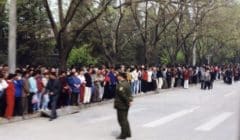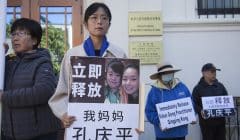Five Years on 42nd Street
Opposite the Chinese Consulate on 42nd Street, New Yorkers silently protest suppression of Falun Gong in China

Opposite the Chinese Consulate on 42nd Street, New Yorkers silently protest suppression of their meditation group in China, Falun Gong. They have demonstrated weekly for five years.
The cement on 42nd Street doesn’t hurt eight-year-old Wesley Wang’s legs anymore; his little body has grown used to it with all the sitting. It’s the thought of his father that hurts.
Wesley hasn’t seen his dad for nearly three years. That’s how long it has been since Wesley’s father was imprisoned incommunicado in China for his beliefs. His dad practices Falun Gong.
“He still wakes up in the middle of the night, screaming, ‘Daddy, Daddy!’” says Wesley’s mother, Celia Wang of Queens. “He asks when Daddy is coming home, and if he is being beaten in jail.”
And I can’t answer him, because I don’t know. The last we heard he had been tortured.”

If Wesley hasn’t lived the normal life of a young boy – no playing catch with dad or piggyback rides – it is a tragedy that’s played out similarly for millions in China, where the practice of Falun Gong is now violently suppressed.
And it is because of this – a persecution so severe some human rights attorneys call it “genocide” – that Celia and Wesley gather with others every week on 42nd Street and sit in quiet protest, opposite the Chinese Consulate.
A Tragedy Hits Home
The demonstrations started in July 1999. It was that month a figure named Jiang Zemin, then head of the Chinese Communist Party, banned the Falun Gong in China, launching a campaign bent on – in Jiang’s own words – “eradicating” the popular group. At that time an estimated 100 million practiced Falun Gong.
As a gentle, apolitical practice similar to Tai-chi, Falun Gong was in Jiang’s eyes “an easy target.” One that Jiang thought would, if crushed swiftly, “demonstrate and solidify the power of the Chinese leadership,” according to The Washington Post. Jiang, many believe, had grown to resent the grassroots practice for its popularity.
New York’s Falun Gong adherents sensed the gravity of what was happening and took to the street – to 42nd Street.
Scott Chinn, a tall, broad-shouldered Manhattan software developer, was one of the first demonstrators. While not Chinese, Chinn felt called to respond.
“When I realized that many of my friends had family in China who were being tortured, it really hit home,” Chinn says.
One such friend is Christina Chai.
Chai’s mother, a medical technician who lives in China and practices Falun Gong, disappeared two years ago. Family in China later learned she was being unlawfully held in a government-run slave labor camp. And tortured.
On top of forced labor, Chai’s mother reportedly has been stripped naked by guards and submerged at length in feces and sewage water. She has also been shocked with electric batons. She turned 61 this year.
“The trauma was unimaginable,” Chai said, with softened breath.
The gatherings on 42nd Street were a bit disorganized at first, participants recall. Makeshift press conferences. Petitioning consulate officials. Massive exercise and meditation demonstrations, showcasing Falun Gong’s peaceable spirit.
“Nobody really knew what to do at first,” Lana Han, a Manhattan attorney, recalls. “We just knew we had to be there, and tell the Consulate that what was happening in China was totally wrong.”
“And I think they knew it, too.”
42nd St. – More Than Symbolic
If consular officials are supposed to represent the people, in Scott Chinn’s mind they haven’t quite lived up to it.
“Every time we’ve tried to talk to them, to deliver a letter – you name it – they won’t even engage us… If we’re telling them about torture and awful things happening in China, you’d think they would want to know and look into it, to fix it.”
But that reluctance isn’t just about saving face, people suggest. Rather, many believe it bespeaks of a much bigger problem: complicity.
Liam O’Neill should know.
Police caught three Consulate officials spying, of all things, on O’Neill and several others active in Falun Gong on their property in rural upstate New York. The Consulate’s Lincoln Town Car, complete with diplomat plates, was hard to miss on the country road. A police report identified the three as Liu Pingjun, Xu Shaozong, and Cong Wu.
“This is serious,” O’Neill commented, his voice rising. “And it’s not an isolated incident. That’s why the FBI got involved.”
Consulate officials have actively pressured local governments to withdraw support for the Falun Gong, with the Chinese Ambassador going so far, in one case, as to suggest they legislate against the group.
Several councilmen report receiving bundles of propaganda materials from the Consulate denouncing Falun Gong.
According to one Newsday report, the Chinese regime’s “relentless drive to beat down the popular meditation movement” can be felt here in New York. Chinese officials have run “seminars” in Manhattan “egging on local Chinese immigrants to oppose the movement.”
“In one session,” Newsday continued, then consul-general Zhang Hongxi “told his audience that immigrants who have not become U.S. citizens were expected to obey Chinese laws, which ban Falun Gong.”
Meanwhile, some in New York, like 56-year-old Wai Lind Lam, have felt the effects of the Consulate’s hate campaign.
When Lam took part in a Falun Gong parade in Chinatown two years ago, a group of thugs – hired by the Consulate, according to two witnesses – tried to light her hair on fire.
Before the persecution in China, such incidents were unheard of.
Through Rain or Snow
When the Falun Gong group realized the Consulate wasn’t quite listening, it started to think bigger.
“We realized we needed to let everybody know what was happening, the whole world,” Chinn says. “We wanted to get the word out.”
With that, the gatherings on 42nd Street grew in size and flavor.
There was the hunger strike. The six-day vigil. Anti-torture exhibits. Marches. Press conferences. And even puppet shows.

mass arrests and killings. Demonstrators sometimes sit all night.
Sometime in 2001 a group of older Chinese-American women – “the aunties,” as they’re affectionately called – committed to a daily presence outside the Consulate.
“The Consulate was trying to demonize us. They were giving visitors [to the building] hate literature and trying to turn people against us.” Qi Zhang, one of the group, shared through an interpreter.
“People would come out of the building and look at us differently.”
The women began preparing informational sheets and pamphlets detailing the suppression in China and describing Falun Gong. The materials were paid for out of their own pockets.
For the last three years, through rain or snow or sleet or hail, the aunties have come every day. “It hasn’t been easy,” Qi Zhang says.
Meanwhile, beyond 42nd Street, a growing contingent of New Yorkers who do Falun Gong have made it a priority to raise awareness.
Activities have ranged from free classes at YMCAs and senior centers to street fairs, health expos, and parades and marches throughout the city. The group has presented at community boards, given presentations to NYPD, and even held health workshops for Fortune 100 companies.
Glimmers of Hope
An ever-growing chorus of voices seems to be recognizing the cause.
Not long ago the New York City Council praised local Falun Gong members, issuing an official commendation “in recognition of their teachings of peace and spirituality, and for their courage and perseverance in the face of oppression by the People’s Republic of China.”
The commendation took note of the local efforts, stating that the group had “tirelessly contributed to community service in New York City.”
In a short span of time recognition had grown, with the New York State Assembly issuing a similar proclamation, and the boroughs of Brooklyn, the Bronx, and Queens each declaring a “Falun Gong Week.”
Back at 42nd Street, growing awareness has swelled the crowds over the years. On some Saturday evenings – the weekly gathering time – participants number in the hundreds.
Gestures of support are more common now, too.
“I had a group of older women stop by the other day and tell me, ‘We pray for you everyday!’” says Ben Freed, a 42nd Street regular and student at Duke Ellington School of the Arts. “It was really touching.”
Affirmations have come in every shape and form, ranging from letters of support to coffee and tea.
On one occasion the aunties opened their eyes after meditating through a downpour to discover that somebody had left each of the group a set of brand new raingear.
And sometimes, well, it has seemed almost like a helping hand from above.
Such as last year, when a car lost control and crashed headlong into the Consulate. The wreck knocked out more than windows.
It went straight into a big display case of anti-Falun Gong propaganda,” Noah Parker, of Queens, recalled. “We were stunned.”
Nobody was hurt in the incident.
Members of the group report that things are improving in China, slowly but surely.
And even Consulate employees seem to be changing. Several have privately approached the demonstrators, wanting to learn more. Others have struck up conversation while outside for a smoke.
For Amy Lee of Forest Hills, the winds of change were felt when her daughter, Luo Meng, finally escaped from China to join Lee here in the U.S. Lee had been separated from her daughter three years earlier when Lee was arrested and imprisoned in China for Falun Gong.
Little Wesley Wang hopes that one day his father will be the one freed.
“I miss him. I hope I get to see him soon,” Wesley shared.
Until that day, Wesley will keep coming to 42nd Street. And others will be there, sitting with him.









